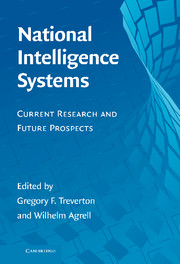Book contents
- Frontmatter
- Contents
- Preface
- 1 Introduction
- PART 1 DEFINING THE FIELD, ITS THEORY, HISTORIOGRAPHY, AND CHANGES AFTER THE COLD WAR
- PART 2 RESEARCH ON NEW CHALLENGES, METHODS, AND THREATS
- PART 3 INTELLIGENCE, POLITICS, AND OVERSIGHT
- 8 The Intelligence–Policy Maker Relationship and the Politicization of Intelligence
- 9 Oversight of Intelligence: A Comparative Approach
- 10 The Limits of Avowal: Secret Intelligence in an Age of Public Scrutiny
- 11 The Science of Intelligence: Reflections on a Field That Never Was
- Index
- References
8 - The Intelligence–Policy Maker Relationship and the Politicization of Intelligence
from PART 3 - INTELLIGENCE, POLITICS, AND OVERSIGHT
Published online by Cambridge University Press: 05 June 2012
- Frontmatter
- Contents
- Preface
- 1 Introduction
- PART 1 DEFINING THE FIELD, ITS THEORY, HISTORIOGRAPHY, AND CHANGES AFTER THE COLD WAR
- PART 2 RESEARCH ON NEW CHALLENGES, METHODS, AND THREATS
- PART 3 INTELLIGENCE, POLITICS, AND OVERSIGHT
- 8 The Intelligence–Policy Maker Relationship and the Politicization of Intelligence
- 9 Oversight of Intelligence: A Comparative Approach
- 10 The Limits of Avowal: Secret Intelligence in an Age of Public Scrutiny
- 11 The Science of Intelligence: Reflections on a Field That Never Was
- Index
- References
Summary
The relationship between intelligence and policy making has been a matter of concern ever since the establishment of intelligence agencies as we now know them. The debate on the particular but related problem of politicization of intelligence has a shorter history. The phenomenon itself is not new. Before World War II, when intelligence was mostly collected by agents in the field, the fragmentary picture that resulted provided ample opportunity for policy makers to draw their own conclusions based on their own knowledge, fixed ideas, or prejudices. However, as intelligence during and after the war became a profession, with an increasingly sophisticated array of technical means of collection and analysis, the intelligence agencies and their products acquired a status which meant they could not so easily be bypassed in the policy-making process. In authoritarian regimes, this was not a problem; there, politicization permeated the entire intelligence process. Thus, for example, the KGB leadership in 1984 instructed its agents that their “chief task is to help to frustrate the aggressive intentions of American imperialism.”
In democratic systems, however, the leeway for simply rejecting intelligence analysts' products in favor of policy-maker preferences became narrower. Policy makers then had to resort to other and sometimes more devious ways of bypassing intelligence that they did not agree with or that did not fit with their policy choices. Thus, politicization of intelligence became an issue.
- Type
- Chapter
- Information
- National Intelligence SystemsCurrent Research and Future Prospects, pp. 179 - 209Publisher: Cambridge University PressPrint publication year: 2009
References
- 3
- Cited by



